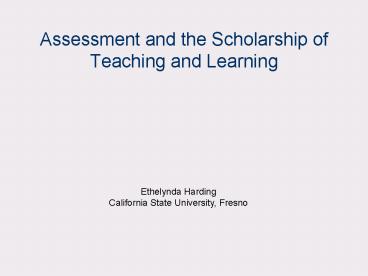Assessment and the Scholarship of Teaching and Learning - PowerPoint PPT Presentation
1 / 24
Title:
Assessment and the Scholarship of Teaching and Learning
Description:
Assessment and the Scholarship of Teaching and Learning. Ethelynda Harding ... Systematic collection of data across ... Normalized Gain (Hake and others) ... – PowerPoint PPT presentation
Number of Views:32
Avg rating:3.0/5.0
Title: Assessment and the Scholarship of Teaching and Learning
1
Assessment and the Scholarship of Teaching and
Learning
Ethelynda Harding California State University,
Fresno
2
Converging Movements
- Outcomes Assessment of Student Learning
- Improved feedback and learning
- Improved teaching
- Accountability
- Scholarship of Teaching and Learning
3
Focus of this session
- Defining student learning outcomes
- Identifying researchable questions
- Systematic collection of data across students
- Classroom action research
- From assessment to scholarship
4
Scholarly Approach to Teaching Learning
- Define the problem
- Search the literature
- Design an experiment
5
Use the Results
- To improve teaching and learning in your
classroom - Inform changes in the way you teach
- Increase students sophistication about learning
6
Disseminate the Results
- So others can learn from your activities
- So that you can get credit for your dedication
and effort
7
Simple Example
- Introductory microbiology course
- After first exam, students were asked anonymous
questions
8
Anonymous questions
- How many hours a week do you routinely study for
this course? - How many hours did you study for this exam?
- Are you satisfied with your performance on the
exam? - What will/can you do differently to improve your
performance?
9
(No Transcript)
10
(No Transcript)
11
Assessment Driven Course Design
- Define student learning outcomes
- Design major learning experiences/assessments to
achieve and measure those outcomes - Systematically collect data across students
12
Define Student Learning Outcomes
- Knowledge, skills, and attitudes expected of a
typical graduate from the class - A few broad goals
- Objectives under each goal
- Students will be able to
13
Design major learning experiences/assessments to
achieve and measure those outcomes
14
Systematically collect data across students
- Use student work products
- Saves time
- Keeps focus on learning outcomes
- Use multiple measures (quantitative and
qualitative) to assess key goals
15
Using Scoring Rubrics to Obtain Quantitative Data
- Determine important traits (Primary Trait
Analysis) - Describe each trait at various levels
- beginning, intermediate, advanced
- number scale
- poor, fair, good, excellent
16
Other Types of Evidence
- Student self-report
- Surveys
- Focus Groups
- Interviews
- Student records/demographics
17
Example of Faculty SoTL
- Prelecture quizzes in Micro 140
18
AAHE Principles of Good Practice in Assessment
- 1. Assess what is important, not what is easy.
- 2. Use a diverse array of methods, including
measurements over time. - 3. First, define and communicate goals or
outcomes. - 4. Attend to the experiences that lead to those
outcomes.
19
AAHE Principles of Good Practice in Assessment
- 5. Assessment works best when it is ongoing
rather than episodic. - 6. Assessment fosters wider improvement when
representatives from across the educational
community are involved. - 7. To be useful, information must be connected to
issues or questions that people really care
about. - 8. Assessment is most likely to lead to
improvement when it is part of a larger set of
conditions that promote change.
20
Angelo and Cross
- Classroom Assessment Techniques
- Provides 50 techniques
- Cross-referenced by discipline
- Categorized by time and energy required
- Matched to teaching goal areas
- higher order thinking
- discipline-specific knowledge
- personal development
21
CATS for Course-related Knowledge and Skills (27)
- Muddiest Point
- Application Cards
- Pre- and post-quizzes or exams
22
Normalized Gain (Hake and others)
- Physicists use force concepts inventory to
measure student learning in introductory courses - Administer pre- and post-instruction
- Calculate increase in scores/possible increase
- Normalized Gain (g) (post-pre)/(100-pre)
23
Attitudes and Values (13)
- Self-confidence surveys (can be pre and post)
- see sample from Microbiology eGuide
- Productive study time log
- Attitude surveys
24
Response to Instruction (10)
- Chain notes
- Pass around an envelope and a set of index cards.
- Ask students to write down what they were
attending to when the envelope reached them. - Survey forms
- Can inquire about an activity, an assessment, a
class, or a number of classes - Mid-course correction































